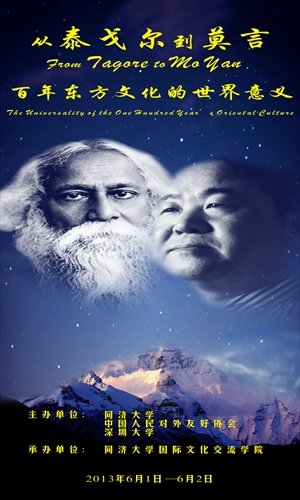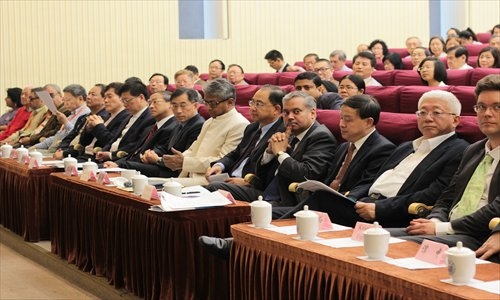
A poster for the conference From Tagore to Mo Yan Photos: Courtesy of Tongji University
One hundred years ago, the 1913 Nobel Prize in Literature was awarded to the Indian poet Rabindranath Tagore. It was generally regarded as a breakthrough as it was the first time an Asian writer had won the prize since the first was awarded in 1901.
However, the prize announcement said that "he (Tagore) has made his poetic thought, expressed in his own English words, a part of the literature of the West," showed that at that time, those awarding the prize still regarded Tagore's works as "part of the literature of the West," rather than the East.
Nearly 100 years later, the 2012 Nobel Prize in Literature was awarded to Chinese novelist, Mo Yan, the fifth Asian writer to receive the prize. (Before him and after Tagore, there were two Japanese winners, Yasunari Kawabata and Kenzabur e, and also Turkish writer, Orhan Pamuk.)
The prize announcement emphasized that Mo's works were deeply influenced by magic realism, which originated in the West.
Although Mo admitted that he indeed had read a few works of magic realism in the past, this award announcement still aroused great controversy among the public. The central issue was how a Chinese writer who mainly described rural life in China could be influenced by Western literary thought.
Last weekend, an international academic conference named From Tagore to Mo Yan: the Universality of the One Hundred Years' Oriental Culture was held at Tongji University. More than 200 experts and scholars (pictured below), mainly from China and India, got together to discuss the Nobel Prize and its influence on promoting Eastern culture.
Zheng Kelu, a leading local translator who has translated many classic French literary works, like Les Misérables and La Dame aux Camelias, into Chinese was one of the speakers at the conference.
"They (the Nobel Prize Committee) thought that the development of contemporary Asian literature was far behind that of the West, and must be influenced a lot by the West. And they judged the works of Asian writers using the criteria of Western literary styles," Zheng said. He believes that even in today's highly globalized society, it will be difficult to change the value system of the Nobel Prize.
He also believes these five awarded writers were chosen due to their being influenced greatly by Western society - they either had experience of living in the West or their works were often compared to many well-known Western writers.
Zheng took Orhan Pamuk as an example. Before receiving the Nobel Prize, the Turkish writer had been awarded many literary prizes in European countries. After Pamuk's Turkish novel, Benim Adım Kırmızı (My Name is Red) was translated into English in 2001, he received the 2003 International IMPAC Dublin Literary Award.

Photos: Courtesy of Tongji University
"The style of his works is always placed in the same bracket as writers of modernism in Europe, like Marcel Proust and Italo Calvino," Zheng added.
Shen Shanzeng, a local author and member of the Shanghai Writers' Association (SWA) agrees with Zheng's opinion. He said that while Mo Yan's winning of the Nobel Prize is something Chinese people should celebrate, it doesn't mean that Chinese culture has been understood or recognized enough by the West.
"What they accept is still the Eastern culture defined within their ideological system," Shen said. "From the prize announcement that they gave to Mo Yan, they were trying to discover the universal values that could be acceptable by Western people from the works of Mo Yan. Of course, I believe that they do it unconsciously."
And Shen said that he still believes there is no denying that a resurgence of Eastern culture is well underway.
Chen Sihe, a professor of Chinese at Fudan University, said he believed that too much emphasis is placed on whether something is from the East or from the West, and that there are more important criteria that can be employed.
http://www.globaltimes.cn/NEWS/tabid/99/ID/786651/Reappraising-Asian-literature.aspx